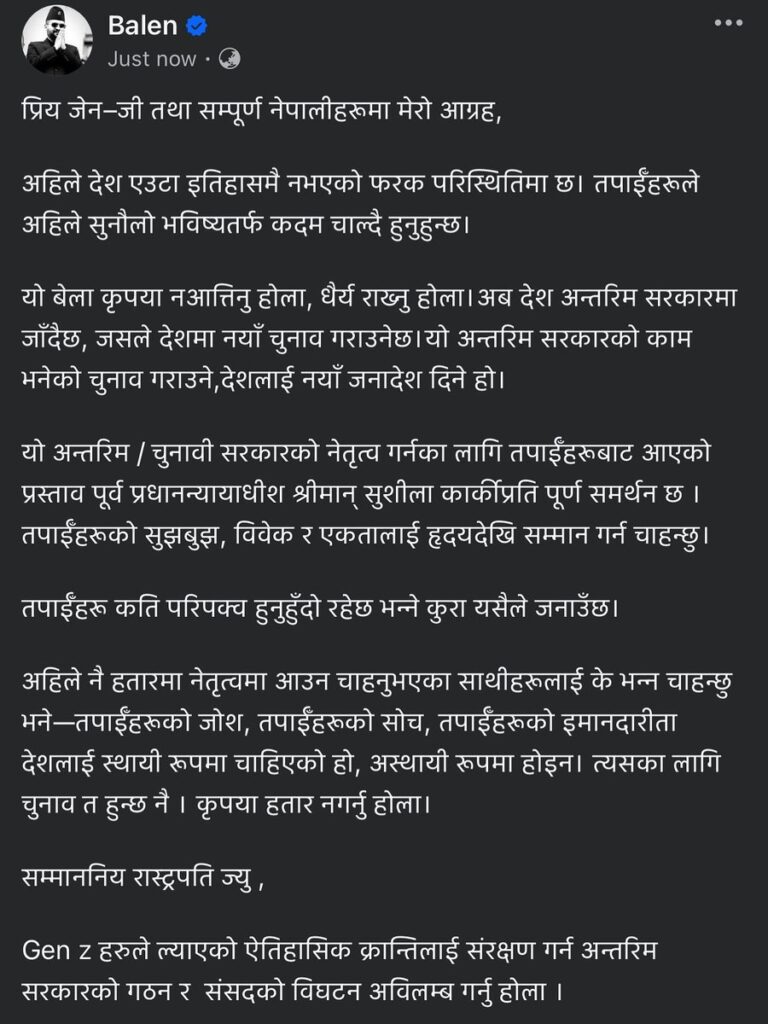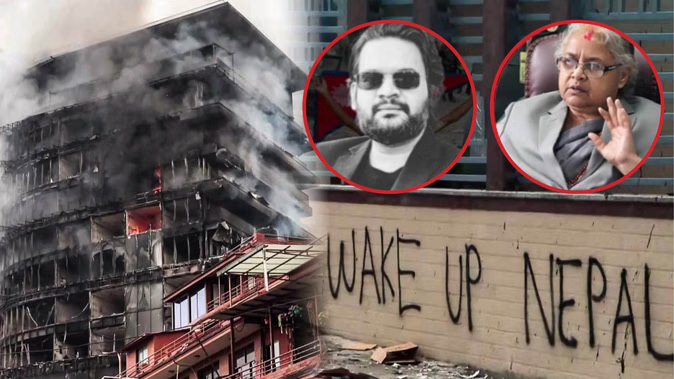Nepal Political Crisis: Interim Government Demands, Balen Shah’s Call for Parliament Dissolution, and Gen-Z’s Role
The political landscape of Nepal remains tense and uncertain, as the country awaits clarity on the formation of an interim government following the resignation of Prime Minister KP Sharma Oli on September 9 amid massive anti-government protests over alleged corruption and suppression of free speech.
Although no fresh incidents of violence have been reported in the past 24 hours, fear still grips the streets of Kathmandu and other major cities. The Nepal Army has taken full charge to maintain order, enforcing strict curfew and prohibitory orders until further notice. Security forces continue to patrol sensitive areas to prevent vandalism, arson, and clashes between demonstrators and police.
The Push for an Interim Government
As protests against corruption and the social media ban intensify, protesters have begun demanding the establishment of an interim government. The movement has gained momentum, with strong backing from the youth-led Gen-Z (Gen-G) groups. Demonstrators have proposed the name of former Chief Justice Sushila Karki to lead the interim administration, citing her credibility and integrity.
Supporting this demand, Kathmandu Mayor Balendra (Balen) Shah emphasized that the Parliament should first be dissolved without delay before any new government structure takes shape. Shah urged protesters to remain calm and patient, assuring them that the country is moving toward a new democratic mandate.
Balen Shah’s Special Appeal to Gen-Z
Taking to social media, Balen Shah addressed the younger generation directly, saying:
“My request to dear Gen-G and all Nepalis is that the country is going through an unprecedented situation. You are stepping into a golden future. Please do not panic—be patient. The interim government will soon be formed to conduct new elections and give the country a fresh mandate.”
Shah further endorsed the proposal to hand over interim leadership to Sushila Karki, praising the maturity, intelligence, and unity of Nepal’s youth. He also cautioned ambitious leaders not to rush into positions of power, stressing that their energy and honesty were needed permanently for the nation, not just temporarily.

Finally, Shah appealed to the President of Nepal, stating:
“The interim government must be established immediately to safeguard the revolution brought by Gen-G. For this, the dissolution of Parliament is essential.”
The Toll of Protests So Far
The past few days have witnessed unprecedented violence:
- 30 people killed and more than 600 injured during the two-day protests.
- 19 protestors, mostly youths, were shot dead by security forces near the Parliament House.
- 3 policemen lost their lives in a mob attack in Koteshwar, Kathmandu.
- 3 more protestors were killed in a clash at Kalimati Police Station.
- Former PM Sher Bahadur Deuba and his wife, Foreign Minister Arju Rana Deuba, were also injured during demonstrations.
According to the Home Ministry, at least 633 people have been injured nationwide.
Curfew and Restrictions
The Nepal Army has extended curfew orders in Kathmandu, Lalitpur, and Bhaktapur until 6 a.m. tomorrow. While essential services are allowed limited movement, citizens are permitted to purchase daily necessities only during two time slots—6–9 a.m. and 5–7 p.m.
India’s Foreign Ministry has issued emergency helpline numbers for Indian nationals in Nepal:
- +977-980 860 2881 (WhatsApp-enabled)
- +977-981 032 6134 (WhatsApp-enabled)
Meanwhile, Sashastra Seema Bal (SSB) reported capturing 35 escaped prisoners from Nepal. Of these, 22 were apprehended on the Indo-Nepal border in Uttar Pradesh, 10 in Bihar, and 3 in West Bengal. Officials warn the number could rise further.
Who is Sushila Karki?
The name of Sushila Karki, former Chief Justice of Nepal’s Supreme Court, has emerged as the most popular choice to lead the interim government. Known for her fearless stance against corruption and unwavering support for democratic values, she actively joined youth-led protests, even after the government used force against demonstrators. Karki described the state action as “murder” of democracy.
When approached by youth leaders, Karki agreed to accept interim leadership only if 1,000 youths signed in her favor. In reality, over 2,500 signatures have already endorsed her.
- Born: June 7, 1952, in Biratnagar.
- Education: Postgraduate in Political Science from Banaras Hindu University (India) and a law degree from Tribhuvan University (Nepal).
Her academic background, combined with her experience in judiciary and activism, makes her a strong candidate for leading Nepal’s transition.
